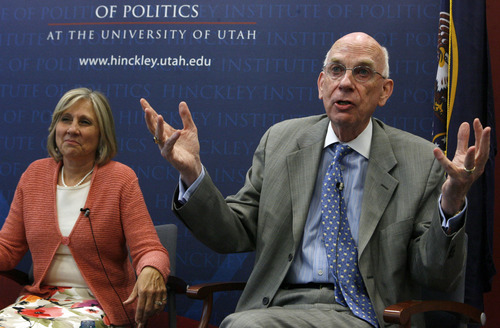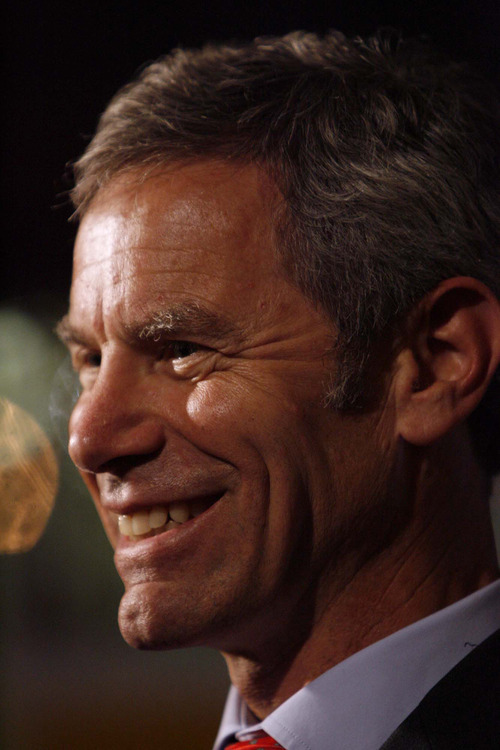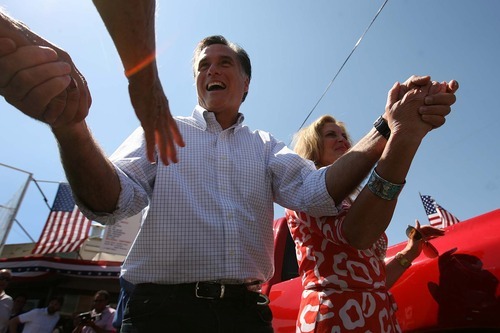This is an archived article that was published on sltrib.com in 2012, and information in the article may be outdated. It is provided only for personal research purposes and may not be reprinted.
With Mitt Romney as a top GOP contender as presidential primaries begin, Americans may start asking tweaked versions of age-old Mormon missionary questions: What do you know about Mormon views on government? Would you like to know more about how they may affect a potential president?
Americans will find such Mormon teachings often are a bit distinct, including:
• Mormons teach that America is a land of promise with a divine role to protect freedom.
• Their scriptures say it is unjust "to mingle religious influence with civil government." So the church does not tell members how to vote and says it does not dictate policy to politicians. It sometimes weighs in on what it calls moral issues, such as gay marriage.
• LDS scriptures say governments should "secure to each individual the free exercise of conscience, the right and control of property, and the protection of life." They also teach that the U.S. Constitution was inspired. Such conservative-sounding principles may be among reasons most U.S. Mormons are Republicans, despite official church neutrality on parties.
• Mormons teach that God instituted governments to benefit mankind. So the church encourages members to seek public office to serve others.
Should Americans fear any such beliefs? Salt Lake City Mayor Ralph Becker, a Democrat who is a nonpracticing Episcopalian, has an opinion based on years as a mayor and a state legislator in a state full of Mormons.
"I don't think the rest of the world needs to be worried," Becker said. "I don't see in my experience that people of the Mormon faith are different from people of other faiths in their approach to making decisions about politics," Becker said. "... all of us are affected by our values and principles in terms of how we look at the world."
The Promised Land • The Book of Mormon, considered scripture by the The Church of Jesus Christ of Latter-day Saints, describes how ancient prophets led groups to the Americas and were taught and visited here by Christ.
One of those prophets, named Lehi, wrote this is "a land of promise" that is "choice above all other lands." He said, "It shall be a land of liberty" as long as inhabitants are righteous.
Another LDS scripture called the Doctrine and Covenants, a compilation of mostly 19th-century Mormon teachings, says God revealed he "established the Constitution of this land, by the hands of wise men whom I raised up unto this very purpose."
This view of America exceptionalism — a nation that stands as a divinely guided beacon of freedom and prosperity to the rest of the world — fits well with conservative political philosophy.
It is largely "consistent with how I think a lot of evangelicals see America," said Quin Monson, a political-science professor at LDS Church-owned Brigham Young University, though "sometimes the language is different because we don't talk to each other about it and have developed different terms."
Monson points to Romney's book No Apology, where he wrote: "I am one of those who believes America is destined to remain as it has been since the birth of the republic — the brightest hope of the world. And for that belief, I do not apologize."
Romney went on to write that "it is inconceivable that America would ever be surpassed by another nation. As long as any of us can remember, America has been the power 'of last resort' — the nation the world turns to when matters get completely out of hand. America stopped Adolf Hitler; we stopped Imperial Japan; we stopped Slobodan Milosevic; we stopped Saddam Hussein."
Government and God •Doctrine and Covenants Section 134, written as an LDS declaration of belief regarding government, says, "We believe that governments were instituted of God for the benefit of man."
It adds that governments should "secure to each individual the free exercise of conscience, the right and control of property, and the protection of life." It also says they "should restrain crime, but never control conscience; should punish guilt, but never suppress the freedom of the soul."
In his major 2007 speech on religion and politics during the last campaign, Romney echoed that view. "Americans acknowledge that liberty is a gift of God," he said, "not an indulgence of government."
Kirk Jowers, director of the Hinckley Institute of Politics at the University of Utah, said such beliefs contribute to a tendency toward conservative politics among Mormons.
They help show "a hands-off approach to government," he said, "and Republicans are seen as embodying that more than Democrats."
As part of the concept of civic duty to bless others through government service, the LDS Handbook for Mormon leaders says, "Members are encouraged to participate in political and governmental affairs," and that includes encouraging them "to consider serving in elected or appointed public offices in local and national government."
Mormons have served in presidential cabinets in such roles as secretaries of agriculture (Ezra Taft Benson), education (T.H. Bell), interior (Stewart Udall), treasury (David Kennedy) and health and human services (Mike Leavitt).
They have been governors of states from Massachusetts (Romney) to Michigan (Romney's father, George) and Utah. They have served in Congress from places such as Oklahoma, Florida, California, Oregon, Idaho, Nevada, Arizona, New Mexico, Utah and American Samoa.
The LDS Handbook for leaders also says, "Latter-day Saints have a special obligation to seek out, vote for and uphold leaders who are honest, good and wise."
That does not mean that Mormons vote only for other Mormons, or those who are active LDS. For example, Mormon-majority Utah is among few states that elected a Jewish governor (Simon Bamberger in 1916) — but all governors since 1956 have been Mormon. Salt Lake City, a bastion of liberalism in conservative Utah, has not elected a practicing Mormon as mayor since 1983, but Utah's Legislature is about 80 percent LDS.
No arm twisting •Doctrine and Covenants 134 says, "We do not believe it just to mingle religious influence with civil government." So the church says it does not dictate policy to its members who are politicians.
Its mormon.org website says, "The church may communicate its views to them just as it would to any other elected official, but it recognizes these men and women must make their own choices based on their best judgment and with consideration of the constituencies they were elected to represent."
That's just the way the church acted with him, says former three-term U.S. Sen. Bob Bennett, R-Utah.
"The church, of course, was a major constituent," he said. "Like any other major corporation in the state of Utah, they had a variety of problems that they would bring to their senator. But never at any time did they bother me in a way that was inappropriate."
Bennett said that doesn't mean some high church leaders did not occasionally tell him when they disagreed with him.
"I did have some correspondence with some of the leading brethren [top LDS leaders] where they expressed, on a personal basis, their dismay with a stance I took. But they took great lengths to tell me they were not writing in their capacities as general authorities. They were writing in their capacity as citizens."
He recalls one such disagreement over a controversial nomination coming before the Senate. "After I responded explaining why I had done what I had done, the general authority involved pretty pointedly apologized to me and told me I was right."
There were many occasions when Bennett and the leaders of his faith agreed and he took action for the church, including adding a provision to a 2005 farm bill that gave churches legal immunity for undocumented immigrants serving in volunteer positions. He also got involved when Russian leader Alexander Lebed suggested outlawing LDS missionaries and when the legality of an LDS temple in Ecuador was in question.
Romney addressed the issue directly in his 2007 speech. "Let me assure you that no authorities of my church, or of any church for that matter, will ever exert influence on presidential decisions," he said. "A president must serve only the common cause of the people of the United States."
Political neutrality• The church, at mormon.org, says, "Although we believe in taking a stand on moral issues, church leaders won't dictate which candidate Mormons should vote for even if a candidate doesn't agree with a publicly stated church position."
Bennett said that shows the LDS Church is a bit different.
"It is not unusual for some of the evangelical churches to distribute voter lists, basically endorsements over the pulpit," he said. "The Mormon Church would never, ever do anything like that. The missionary system does not thrive if word is that Democrats are not welcome in the Mormon Church, or if they ask for your political affiliation when you knock at the door."
Monson said the church early in its history — and into the early 20th century — did endorse some candidates. "The young church learned pretty quickly that was a problem, and sometimes it backfired."
Mormons wouldn't always follow leaders' advice at the polls, even on moral issues. Perhaps most famously, LDS leaders fought the repeal of prohibition in 1933 — but Mormon-majority Utah still ratified repeal as the final state needed for passage.
Monson notes some people do not believe the church is truly neutral on politics, but he says that comes largely from misunderstanding what the church considers the moral issues it will take stands on — such as fighting liquor, gambling and gay marriage and even weighing in on immigration (framing it as a moral issue that affects families).
"The church would say it has every right and responsibility to speak out on moral issues, and if the moral issue happens to divide people in a partisan way, you're going to have people who look at it as a partisan activity," he said. "That's where the difficulty is. I don't think the [church] members misunderstand that, but the broader public usually doesn't make those distinctions."
Free to differ • Bennett and others also say Mormons are free to support beliefs across the political spectrum without worry it may affect their church standing.
"I cannot imagine any circumstance," Bennett said, "where my temple recommend [for faithful members] would be in jeopardy if I voted differently than the brethren wanted me to."
Monson said he saw numerous Mormons, for example, take public stands opposite that of the church on California's Proposition 8 initiative on gay marriage and saw no formal repercussions. "I don't know of any instances where people have been disfellowshipped or excommunicated or drummed out."
But there can be social consequences.
"There are likely occasions when church members in the minority are very uncomfortable," Monson said. "Being a Mormon and a Democrat could be enough to make you feel uncomfortable, not just being in California and opposing Proposition 8."
Party exception? • The church officially is neutral on political parties. But a recent Trinity College poll showed U.S. Mormons favor the Republican Party by a 4-to-1 margin nationally, and more than 9-to-1 among Utah Mormons.
Church leaders on occasion have addressed the issue and assured their nonpartisanship, including sending out a statement to that effect before every election cycle. In a 1998 interview, Marlin Jensen, a general authority in the LDS First Quorum of the Seventy and a Democrat, told The Salt Lake Tribune: "We regret that more than anything — that there would become a church party and a non-church party. That would be the last thing that we would want to have happen."
Mayor Becker believes top LDS leaders are serious when they stress neutrality on parties. "But there is the almost bizarre but thoroughly ingrained view among the rank and file that you can't be a good Mormon and a Democrat."
Some exceptions exist, of course. U.S. Senate Democratic leader Harry Reid of Nevada is a faithful Mormon.
"Harry Reid would vote one way," Bennett said, "and I would vote the other way, and the brethren would be equally pleased with both of us if we did our home teaching," a duty given to active LDS men to check on assigned families every month.
In addition to the usual reasons cited for a three-decade-and-counting disconnect between many Mormons and the Democratic Party — moral issues — Monson says the clarity of conservative stands appeals to members.
"Political conservatism is much more friendly to the idea of absolute truth. And political liberalism is much more friendly to the idea of not having a strict moral standard, that you can have lots of people who can be right at the same time," he said. "Even when liberals have issue stances that should be friendly to Mormons — Mormons are supposed to care for the downtrodden and poor — they don't feel at home with people who have an ideology that doesn't share the same foundation."
State Democratic Party Chairman Jim Dabakis, who notes he is a former Mormon and is the first openly gay chairman of a major party in Utah, says more Mormons are being attracted to a new LDS caucus in his state party because more of them do not feel at home among Republicans. "It's taken off like a rocket. As Republicans move further and further off to extreme-right land, a lot of Republicans are horrified."
It's a trend that hasn't gone unnoticed by Mormon leaders, he said. "The [LDS] Church is wise enough to realize that if it is connected to the extreme right wing, it is not good for the church — and balance is in its interest."
Leaders out of politics • The LDS Church now bans its top full-time leaders and their spouses from participating in political campaigns, including making donations or endorsing candidates.
Part-time leaders — such as bishops over congregations — are allowed to do that, but are cautioned to make clear they do not represent the church.
Bennett said that helps ensure the church's stance on partisan neutrality is taken seriously. He said that even part-time leaders are released from major callings when seeking statewide or higher office.
He recalls that Richard Eyre was released from his position on the high council of his stake when he announced his candidacy for governor in 1992. Bennett, when he first ran for the U.S. Senate that year, was told he needed to be released as bishop of his LDS ward. But, he joked, "They didn't get around to releasing me until after I was elected because I was sure I was going to lose."
One of the reasons for that, Bennett added, was so that a person's church callings can't be used in campaign literature or in campaigning.
Former state Rep. Trisha Beck said some bend the rules.
An opponent in her Sandy district lined up endorsements of local LDS leaders of women, youth and congregation groups — then sent targeted lists to individual LDS stake areas (or clusters of congregations), improperly implying church endorsement. She lost the election.
"It broke my heart because I am active LDS," she said. "Some automatically follow someone who is their bishop or Relief Society president because they think they are someone who is trustworthy who has done research, but they need to research things out on their own."
The LDS Handbook for leaders says that unless ordered by the First Presidency, "Stake presidents and other local leaders should not organize members to participate in political matters or attempt to influence how they participate."
The ban on leaders running has come only in recent decades. Joseph Smith, the founding prophet of the church, ran for U.S. president. Reed Smoot was a Republican senator from Utah for 30 years while simultaneously serving as an apostle. The last top LDS authority to hold political office was Ezra Taft Benson, then an apostle. He was agriculture secretary during the Eisenhower administration.
Bennett said bias against Mormons in politics has been reduced over time as the faith and its members have become more familiar to Americans.
"I came across no hint of anti-Mormon prejudice in the Senate. My father [former Sen. Wallace Bennett, R-Utah] felt a little of it. That's the difference between being elected in 1950 and 1992. In the intervening 42 years, it pretty well disappeared."
Still, a recent Salt Lake Tribune poll revealed that 26 percent of likely U.S. voters say they are somewhat or very uncomfortable about voting for a Mormon for U.S. president — showing the church still has far to go in winning the trust of many Americans.
About the series
With the Iowa caucuses coming Tuesday and an LDS candidate seen as the GOP front-runner, The Salt Lake Tribune today begins a series of occasional stories exploring the intersection between Mormonism and politics.
Coming Monday • Mormonism and the economy
Coming Tuesday • How their faith influences LDS politicians







